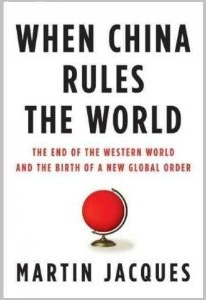As part of a series of events and films marking its tenth anniversary year, the AHRC, which funds the BICC though its LBAS scheme, has made a short film about the ‘Historical Photographs of China‘ project at the University of Bristol. The project has received a lot of support from BICC and the AHRC, and is also being showcased on 2-4 March at the government’s UK Trade & Investment’s ‘GREAT Festival of Creativity’ in Shanghai.
Monthly Archives: February 2015
Manchester BICC and the Centre for Chinese Studies welcomes Martin Jacques
When China Rules the World- A talk by Martin Jacques
Manchester University Samuel Alexander Lecture Theatre, School of Arts Languages and Cultures, 23rd February 2015, 12-1pm
First published in 2009 to widespread critical acclaim – and controversy – When China Rules the World: The End of the Western World and the Rise of a New Global Order has sold a quarter of a million copies, been translated into eleven languages, nominated for two major literary awards, and is the subject of an immensely popular TED talk. He has been invited thanks to BICC funding and will host a talk at Manchester University on the 23rd March, where he will meet current students studying Chinese Studies and History at undergraduate and postgraduate level and members of the public.
Since the first publication of When China Rules the World, the landscape of world power has shifted dramatically. In the three years since the first edition was published, When China Rules the World has proved itself to be a remarkably prescient book, and transformed the nature of the debate on China.
Now, in this greatly expanded and fully updated new edition, with nearly three-hundred pages of new material, backed up by the latest statistical data, Martin Jacques renews his assault on conventional thinking about China’s ascendancy
Martin Jacques is the author of the global best-seller When China Rules the World: the End of the Western World and the Birth of a New Global Order. It was first published in 2009 and has since been translated into fourteen languages and sold over 350,000 copies. The book has been shortlisted for two major literary awards. A second edition of the book, greatly expanded and fully updated, was published in 2012. His TED talk on how to understand China has had over 1.8 million views. He is a Senior Fellow at the Department of Politics and International Studies, Cambridge University, and a Visiting Professor at Tsinghua University, Beijing. He is also a non-resident Fellow at the Transatlantic Academy, Washington DC.
He has previously been a Visiting Professor at Renmin University, the International Centre for Chinese Studies, Aichi University, Nagoya, and Ritsumeikan University, Kyoto. He was a Senior Visiting Research Fellow at the Asia Research Institute, National University of Singapore. He was until recently a Senior Visiting Research Fellow at IDEAS, a centre for diplomacy and grand strategy, and a fellow at the Asia Research Centre, both at the London School of Economics. He was formerly the editor of the renowned London-based monthly Marxism Today until its closure in 1991 and was co-founder of the think-tank Demos. He has been a columnist for many newspapers, made many television programmes and is a former deputy editor of The Independent newspaper. He took his doctorate while at King’s College, Cambridge.
He has been invited to give lectures at many of the world’s top universities including Harvard, Cornell, UCLA, USC, Cambridge, Oxford, Peking, Tsinghua, Renmin, NUS, Tokyo, University of Hong Kong, amongst many others. He has given talks to many corporate clients including Bank of America, BlackRock, Pictet, Shell, Allianz, BNP Paribas, Financial Times, British Telecom, BBC, HR50, Amerada Hess, Investec, DSM and Khazanah.
He is chair of the Harinder Veriah Trust, which supports girls from deprived backgrounds with their education at Assunta Primary School and Assunta Secondary School, Petaling Jaya, Malaysia, where his wife, the late Harinder Veriah, was educated. It has also sponsored young Malaysian lawyers from under-privileged backgrounds to work for two-year stints at Hogan Lovells in London.
Tickets for the public can be obtained at https://eventbrite.com/event/15740814199/
Nowhere to Call Home (无处为家)
Aside
Nowhere to Call Home- UK Premiere of Globally Acclaimed Film, BICC Manchester
A film by Jocelyn Ford in Tibetan, Chinese and English, with English and Chinese subtitlesTuesday 03 February, Manchester University- BICC/Centre for Chinese Studies
“Deeply moving, ethically challenging and utterly compelling.” –Jonathan Watts, The Guardian
The UK premiere of this globally acclaimed film! Hosted by Manchester University BICC
.
Nowhere To Call Home tells the powerful story of Zanta, a Tibetan woman who moved to Beijing against the wishes of her in-laws so that her young son can get an education. The New York Times in an article titled “Inspiring Dialogue, Not Dissent, in China,” wrote: “The film breaks down the sometimes romantic Shangri-La view that Westerners have of Tibet … and offers a shocking portrait of the outright racism Tibetans face in Chinese parts of the country.”
In August the documentary premiered in the U.S. at MoMA, and in the autumn Nowhere To Call Home premiered in China as the inaugural film at the opening of the Center for Documentary Studies in Beijing. It has been garnering an extraordinary track record of acclaim from both Tibetans and Han Chinese in the PRC, with a leading anthropologist describing the film as “very important for inspiring our imagination on modern China’s transformation.”
SYNOPSIS Widowed at 28, Tibetan farmer Zanta defies her tyrannical father-in-law and after her husband’s death refuses to marry the family’s only surviving son. When Zanta’s in-laws won’t let her seven-year-old go to school, she flees her village and heads to Beijing where she becomes a street vendor. Destitute and embattled by discrimination, Zanta inveigles a foreign customer into helping pay her boy’s school fees. On a New Year’s trip back to her village, Zanta’s in-laws take her son hostage, drawing the unwitting American into the violent family feud. The two women forge a partnership to try to out-manoeuver the in-laws, who according to tradition get the final say on their grandson.
DIRECTOR Jocelyn Ford, former Beijing and Tokyo bureau chief for the U.S. public radio show “Marketplace,” has been based in East Asia for three decades. Her groundbreaking reporting on “comfort women” in the 1990s was a catalyst for raising awareness about World War II abuses of women by Japan’s military. During three years of filming Nowhere To Call Home, Jocelyn overcame restrictions on access to Tibetan communities to shine light on the complex choices facing Tibetan farmers living in contemporary China, and to lend new insights into the social fragility of the world’s fastest rising power.


